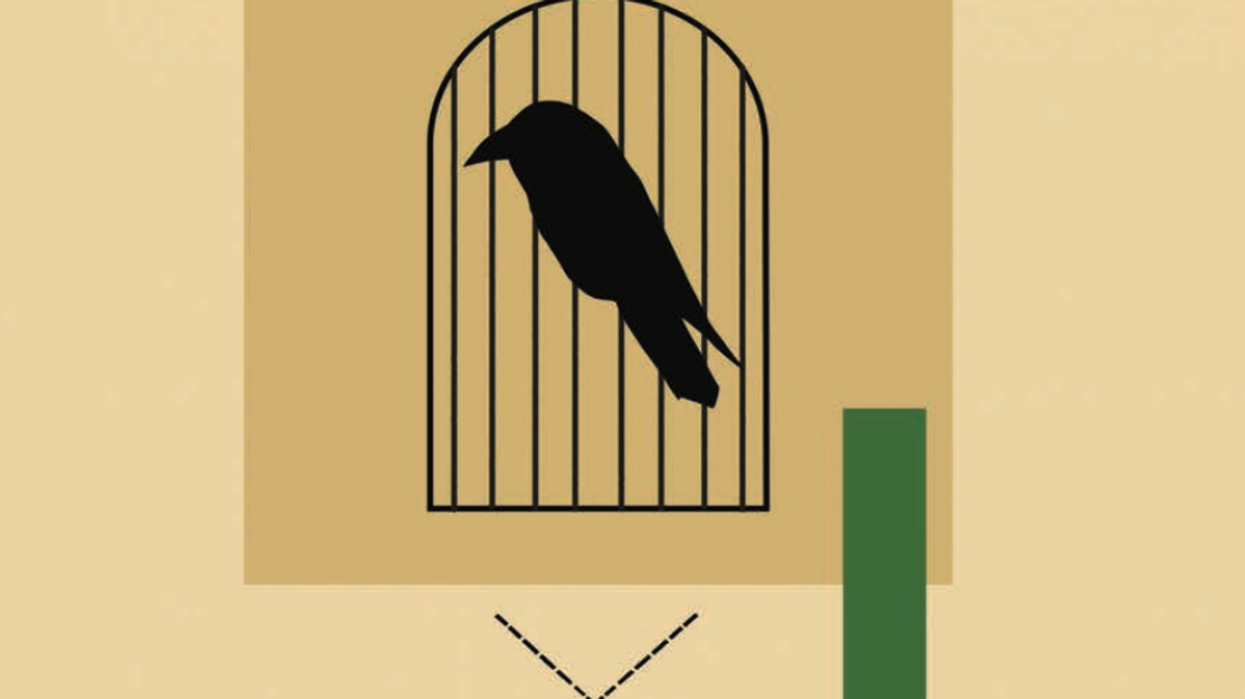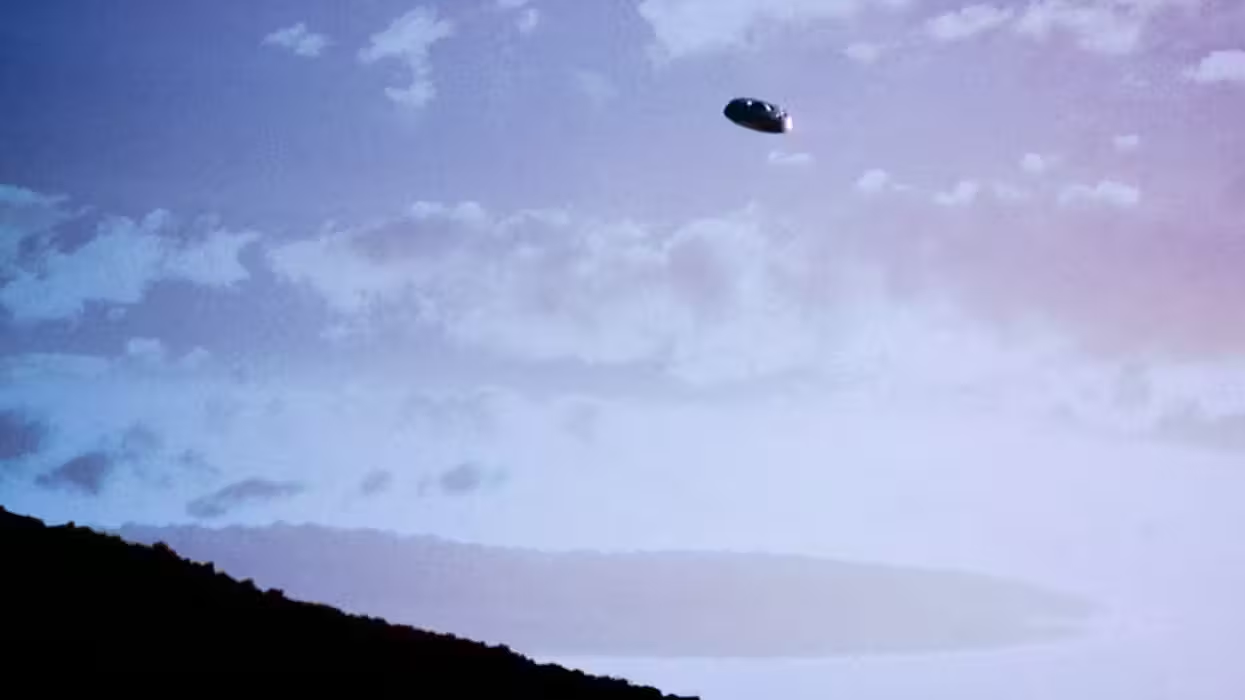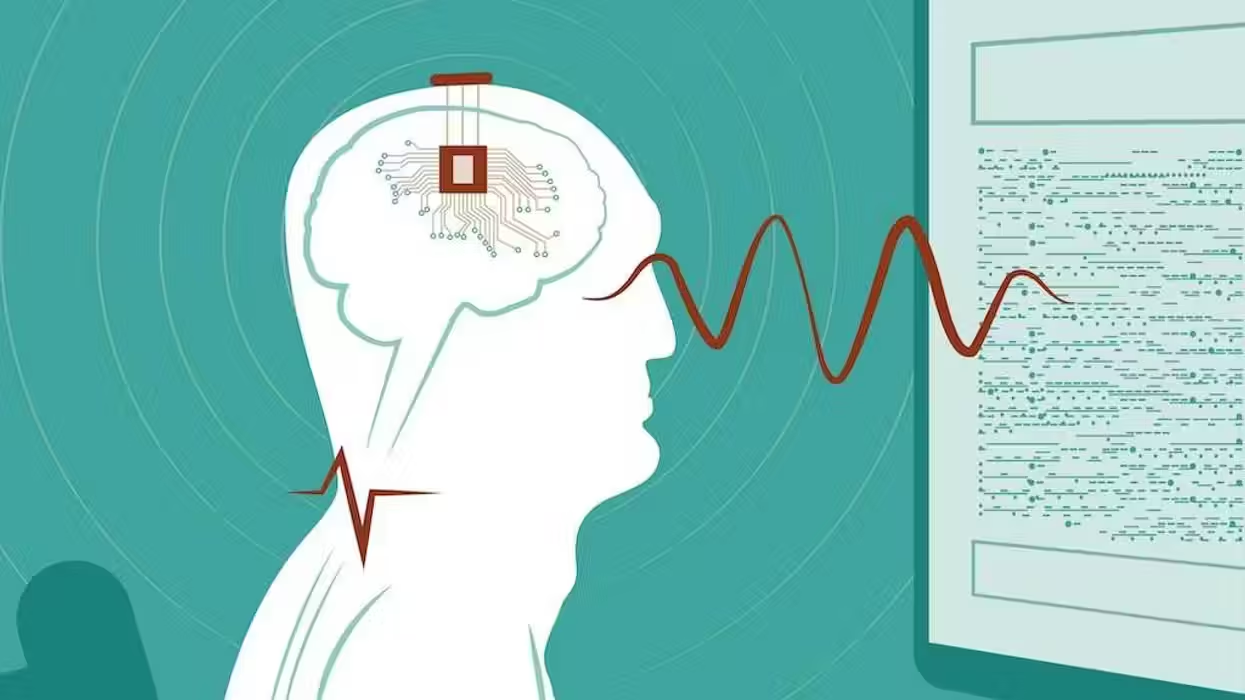
© 2025 Blaze Media LLC. All rights reserved.
The day Ben has dreaded for years has finally come: the day of his release from prison.
He strides into the Great Hall to bid farewell to his fellow knights and squires. Sir Gilthwaite hails him with a raised, mailed fist, his other hand clutching the leg of a roast grouse. Sir Bryllwyn, the senior member of the order, a pockmarked, red-bearded giant of a man who lost his left ear in close combat with a Moor, stands from his chair and roars at him in greeting, his words indistinct, as he also lost his tongue. Two other Crusaders, the youngest of the crew, whose scripts and characters Ben spent less time on, making them less distinctive than the others, respectfully nod at him, then go on eating. They are watched by a hungry raven, Angel Fire, whose cage hangs from the ceiling by a gold chain. The gold was an indulgent, capricious touch – the chain would have been made of iron, Ben’s research showed – and he was docked two ReCoins for the error, but when given the chance to correct it, he declined. His castle world, he felt, belonged to him, and the ReCoins he’d earned devising and building it were his to sacrifice if he desired.
In the lower right corner of the screen, next to the box displaying his ReCoin count, a digital clock ticks swiftly down. The Exit Protocol will start in moments. “Good night, my faithful brothers.” He bows to them. He hears the hinges of his armor creak and exults for the last time in the magnificence of his build and stature. Soon, he will shrink six inches in height and lose the strength to draw the bowstring that slew so many foes. Soon, he will leave the Forest of Four Peaks and return to the dismal flats of his old life.
The Exit Protocol blacks out the screen. He finds himself seated in a small office decorated with stubby desert plants and color photos of Olympic athletes, both on the stand wearing medals and in action, kicking balls and grappling on mats. Across from him, on a backless stool with casters, a slim young fellow in a loose grey jacket with a pocket ID badge that reads “Russ” is already speaking to him about his future.
“The good news, before we preview the conditions of our changed society,” says Russ, who is clearly some sort of recording or transmission – a bit too speedy, with tiny skips – “is that you’re already inside your new apartment. You’re situated, Ben. You’re safe at home.”
He’d suspected as much. They‘d moved him in the night. He woke up sluggish this morning, drugged, confused, a medicinal, bitter taste coating his gums and tonsils.
“Where am I? Am I back in Utah?”
Russ nods, then activates a series of slides that appear to float at his right shoulder. Ben ignores his narration and fixes on the images. There are hospitals, tram depots, schools, and apartment buildings, all of them new and built in a clean style combining classical geometries and faintly primitive ornamental touches with a Central American, Mayan feel. Some of the buildings stand in fields and deserts, alone and pristine, as though waiting to be inhabited. Or perhaps they’re served by tunnels Ben can’t see. His impression is of a world grown serious, of a country devoted to austere essentials. The last set of slides shows people absorbed in life, in offices, laboratories, lecture halls, on the parade grounds of military bases, and at home with their families doing household chores, helping children with homework, and celebrating birthdays.
“A quick collage,” says Russ. “A taste of things. In some ways, it may not look like much to you, but the point, I think, is renewal, and regeneration. We’ve cleaned up our act, Ben. And none too soon, I’d add. Impressions? Observations? Questions?”
“Why is no one wearing headsets?”
Russ smiles and sits up straighter on his stool. “I thought you might catch that. I’m very glad you did. You’ll probably find this ironic, considering, but they’re illegal now. Prohibited. Not as penal tech, quite obviously, but in ordinary life. In fact, the reason we still use them here is precisely the reason they’ve been banned out there, along with other Class A Escapist Instruments. They isolate. They lead to disengagement. Amusement is one thing – we all need relaxation – but fully exiting the Cognitive Commons, just vanishing down your private little dream hole, is something society realized it just can’t tolerate.”
“When did it realize that?” Ben felt apprehensive. In his mind flashed an image of Angel Fire, caged.
“A while back. It's hard to say,” said Russ. “But the Fantasy Codes weren’t passed until two years ago. A bipartisan triumph, frankly. Cause for hope.”
They spoke a bit longer. The focus was on the practical, including the use of Ben’s ReCoins for goods and services. Russ said Ben’s supply would last two months, but he urged him to seek employment well before then and join the increasingly vibrant GenCoin sector. He reminded him to wear his HealthBand, to heed its advice on diet, sleep, and exercise, and to check in according to schedule with Department. “And no more contract violence,” he joked. “No more broken limbs. Honest associates and smart decisions!”
Then he turned off Ben’s headset and set him free.
Ben’s apartment was small and nothing to speak of, equipped with a TV he didn’t watch, a shower that offered five minutes of hot water, an armchair covered in shiny stain-free fabric, and a firm double bed that made his hips ache. The apartment was part of a thirty-unit building in an area of new development filled with other structures of its size with social services offices on their ground floors and rows of portals for receiving deliveries. The tenants were other single men who seemed to be out of favor with society and wary of approaching one another. He felt uncomfortable in the place, probably by design, he thought, as a way of pushing him out into the world. He suspected he had been housed there all along, not in this particular unit, perhaps, but in a smaller one somewhere in the same complex. Certain chemical smells in the lobby and the elevators seemed curiously familiar.
He spent a week exploring his environs on a public motorized bike. His muscles, maintained over the years by direct electric stimulation and twice-weekly sessions in a robotic gym, surprised him with their responsiveness and power. He also looked healthier than he’d anticipated, especially in natural light, when he saw his reflection in windows and polished surfaces. All he had lost, it occurred to him, was time, and really not much of it: a mere four years engrossed in an invigorating dream world wholly of his own invention and, it seemed now, remarkably restorative. The synthetic narcotics that had laid him low once no longer held any appeal for him, he realized, nor did he feel compelled to seek out sex or other forms of risky intense companionship. He felt rehabilitated indeed.
His favorite area to explore lay north of downtown, in a faded warehouse district renovated only at the edges. Cruising its grid of streets and alleys one morning, he spotted the entrance to a charming coffee shop located in a former commercial bakery with weathered murals of bread loaves, rolls, and pretzels on its soot-streaked brick exterior. The shop was called The Orbiter, the image on its pub-like wooden sign an antique rocket ship trailed by stylized flames and puffs of smoke. He went inside and felt at home immediately, pleased by its hodgepodge of homely chairs and sofas and its warren-like layout, which promised a certain privacy. What delighted him most, though, was The Orbiter’s theme: vintage science fiction. There were posters for classic movies on the walls, a reading room stocked with dog-eared paperbacks, and a spacious yet intimate-feeling salon or gallery where customers of all ages, some quite elderly, sat in upholstered chairs beside long tables playing antiquated cartridge games on nostalgic-looking handheld consoles. The Fantasy Codes only went so far, it seemed, and didn’t apply to such dated, quaint diversions. The Orbiter flourished because of this, Ben reasoned. It would be his oasis. He knew it on his first visit.
One afternoon the smiling brisk old fellow Ben knew to be the owner of the shop, a man whom Ben had heard addressed as Ollie, sat down on the love seat in the reading nook where Ben was curled up with a novel about a space mine.
“Excuse my forwardness,” said Ollie, “but I’ve noticed you pay with ReCoins, which means to me that someone, not you perhaps, but someone” – he laughed in a way that wrinkled his whole face – “would like to see you transition to a job. Is that a good guess?”
Ben allowed himself to nod. Though it had been six weeks since his release, he rarely indulged, even briefly, in conversation. He saw no use in it. Given the nature of his recent experiences, he had very little in common with normal people, and he coveted both his emerging inner life, much of it drawn from the bookshelves at the Orbiter, and his still-piercing memories of Castle World. They weren’t diminishing as he’d thought they would, and keeping them at bay, in place, was proving something of a struggle.
“I’m serious,” Ollie said. “You suit The Orbiter. There’s a role for you here. I’m intuitive. I know."
“I’m shy,” Ben said. “I’m very shy, I’m sorry. I don’t enjoy interacting with the public.”
“Which is fine,” Ollie said. “You’d work alone. Upstairs. Finish your coffee and let me take you up. I’ve hired several men like you before, and most of them flourished; don’t waste this opportunity. If you do, the Department may push you into something. Our culture is no longer lax the way it was. We’ve adopted a new approach, such as it is.”
Ben’s HealthBand snapped twice, indicating rising tension. He shut his book but kept it in his hand, something to steady himself. “I understand.”
Above the shop was a long, high-ceilinged room with metal industrial shelving along the walls. About half of the shelves were stocked with books and cartridges of the same age and condition of those downstairs. All were for sale, said Ollie, and some were valuable, the result of over a decade of collecting. Ben would prepare them for shipping as orders arrived. There were also shelves of toys and dolls and role-playing games that relied on cards and dice, many associated with shows and movies produced before Ben was born but known to him from older members of his foster families. Seeing these radiant totems in such profusion, many still in their original packages, shocked his memory, almost bringing tears. His years in prison had melted his sense of time, nearly stalled it altogether, but suddenly he was sharply conscious of having traveled a certain path through life, of accumulating experiences in sequence, perhaps in the service of a goal or purpose. As Ollie finished showing him the stock and explaining the nature of his prospective job – fulfilling orders, keeping inventory, arranging auctions for special items – Ben felt a surge of gratitude and hope. He accepted Ollie’s offer and thanked him for it.
“I’m pleased. Do you have any questions? You must have some.”
“Not really. I don’t think so. Maybe one.”
“Fire away.”
“The Code. Is it a problem?”
Ollie pursed his lips. His nostrils flared. “Another superstitious moral panic. For a country with alleged Puritan roots, it’s always game for an orgy of self-righteousness. Only this time, instead of demon rum or ‘jungle music’ or communism, it’s an essential mental faculty: the imagination. Well, fancy that. We’re all born defective, defective at the root, squirreling away our dreams to starve the group. Thou shalt not spill one’s dreams upon the ground. It may be our final, most perverse delusion, and heaven knows how far they plan to take it. The truth is, they’re tyrants. They want to rule it all. From ear to ear, from neck to scalp, every last neuron in every human skull.”
Ollie paused to let heat drain from his skull. His chest heaved gigantically. He chewed his lips.
“I agree with you,” Ben said.
"What’s important to know in your case,” Ollie said, “is that we’re fully Code-compliant here. Legally, at least. Not philosophically. Not everyone in the community approves of me. To some, I’m a nuisance figure, a pornographer, but to others, the fervent ones, I’m evil. I’m demonic. And sadly, I do get threats. Quite ugly ones. And occasionally a rock comes through a window. But I’m proud of this business. I’m proud of what it stands for. A flickering little lamp of pure 'fuck you.'”
Ben felt moved to respond to this speech with a confession. His desire to trust and be trusted, to be known, so long suppressed, grew urgent suddenly. “In prison, after my first month, after the interview process and intake testing, they moved me to Tier I Virtual Confinement. It’s a program they offer for offenders with impulse disorders and anti-social and a high potential for self-harm. They train you to build a world where you feel safe, and then they provide the support you need to live there. I chose a medieval idea. I built a castle.”
“Respect and admiration,” Ollie said. “The truth is, I knew this already. I ran your ReCoins. I checked with certain contacts who know your case, which led me to think you belong here. You’re one of us.”
"I’ve never been one of anything,” said Ben.
“Except, unfortunately, your gang.”
“We weren’t even a gang,” Ben said. “Just sad young druggy f**k-ups who needed money, with incredibly dumb ideas on how to get it. I’ll tell you someday.”
“Leave it in the past. I’ll start you Monday. There’s paperwork to do for the Department, but Monday is Ben Day.”
“I’ve never had a boss before. I wonder if that was my problem. No boss,” said Ben.
Ollie waved him forward for a hug. It lasted a while. Ben wouldn’t let it go.
Ben showed up at noon most days and worked till night, after the coffee shop shut down at seven. He had a key to the back entrance and a staircase used by no one else. He was paid by the hour, but the job was structured task-wise, project by project. Ollie never rushed him and came to see him no more than twice a day. During his second month, he brought a chair up, a soft old recliner to read and nap in, which allowed him to work through to midnight, if he chose. He’d rearranged almost all the stock by then, shelving it according to a system based on mythology, symbolism, setting, and other classifications of his devising. He’d touched every item by then, absorbed its energies, reflected on its meaning and its form. And somehow, in a way he didn’t will, certain figures, objects, games, and books conspired to weave a story around themselves about a dimension of demi-gods or powers that guided events on earth through laws and forces of a tremendous spiritual intensity which Ben found both elusive and inspiring. He had been raised in homes without religion, by foster families and distant relatives, some of them defeated and unkind, and he lacked a vocabulary for higher things. A missionary he’d sat with on a bus once gave him a Bible to keep and write his name in, but his Aunt Lenore, a luckless drunk, took it into the bath one night to read and let it fall into the water.
One Saturday night at exactly nine p.m., having finished all his chores for Ollie, Ben set out the elements of his story-world on the attic’s smooth plank floor and prepared for a long exploratory session intended to reveal its deeper workings. Castle World had lost its hold on him; it seemed crude to him now, a juvenile playland. He preferred his new realm of magistrates and angels, of covenants and commandments, of cosmic pacts. He’d marked out the boundaries and features of his domain with stick of yellow art chalk, and he sat at its center, thinking, making moves. He’d fasted that day to purify his being and felt unusually close to his creation, as though he could finally hear its coded whispers. He jotted them down in a notebook when they came. He also had a Bible at the ready, a paperback Good News! edition he’d found in the shop one night while cleaning up.
The door to the back staircase rattled. It did that sometimes. It fit poorly in its frame. Ben proceeded with his studies. A moment later he heard a crashing noise, a targeted blow to the door of splintering force. The stairwell was at the far end of the room, and when he rose and started toward it, a terrible odor met him, a burning odor. He reached the stairs, looked down, and saw its source: a smoldering garbage bag, open, spilling trash, certain scraps of it actively on fire, others glowing and curling, about to catch. The fire extinguisher, mounted on a bracket next to the bookshelves, wasn’t near to hand. Ben rushed toward the flames, prepared to stomp them out, then saw he could kick the bag into the alley through the crack beside the open door. He stood at an angle, one hand over his mouth, and kicked it soccer style. Its heat made it buoyant. It flew, sprayed sparks. It combusted on landing. He stood and watched it burn.
From the end of the alley, a figure, not alone, part of a small ragged group in silhouette, yelled “Final warning! Death to wizards! Go!” The group retreated, broke up, and ran away.
Ben phoned Ollie, who came in within ten minutes. The bag had gone out. They inspected the charred debris, poking at it with two sticks they’d found. Action figures. Melted cartridges. A starship of interlocking plastic bricks. A contraband headset. Animal manure. Blackened paper. Pages torn from books.
“’Clarity.’ That’s what they call themselves. The goons. Pathetically enough, they’re all adults. I caught them on camera once. One comes in the shop. Police dispatcher. Tim Bliff. Untouchable. ‘Death to Wizards.’ That sounds like him.”
“I hope he dies,” said Ben.
Ollie turned over the starship with his stick. Stuck to its bottom was a scorched playing card from Quantum Assassin: Riot in Orion. He flicked it off, then flung away his stick.
“I’m glad you were here to handle this,” said Ollie, “but frankly you might have been injured, Ben. Or worse. You do a good job, but this is not your clubhouse. I know you enjoy your pastimes there, your hobbies, but no more late hours. You have to leave by eight.”
Ben met Ollie’s stare and said, “I understand,” but his mind was elsewhere: on Tim Bliff. He’d seen his frame, his outline. He’d heard his voice. He even seemed to recall him from the shop. V-neck sweaters, always with a tie. Floppy canvas hat with a red band. Gold pin in the band. Some medal. Some police thing. The truth was, Ben had been in a gang. Even in Castle World. Gangs were all there were.
On Saturday he came in early and scrubbed the chalk marks from the floor upstairs. He erased his new realm. He was glad he’d never named it. It lived inside him, what was left of it, and he could reconstruct it later, fill it in, enlarge it. When he had time. Its essence was justice, energy in balance, the spin and counter-spin of self-correction agitating the empty heart of matter. At exactly a quarter to noon, he went downstairs and ordered a three-shot espresso and a sweet roll, took them into the gallery, the game room, and sat in the furthest corner, so he could watch.
Tim Bliff arrived at twelve-fifteen, as always, and sat with his juice and muffin at the long table strewn with game consoles, batteries, and chargers. He tore his muffin into chunks and fed himself like a pigeon in the park, popping them into his mouth between pinched fingers. He seemed to be keeping a schedule. He kept his hat on and finished his juice in three long equal gulps. He picked up a console and played for a few minutes, set it down, went to the men’s room, came out unzipped, noticed this, fixed it, and left through the side door, the one used by bikers because the rack was there. Not once had Ben seen him look at him or even in his direction. It hardly mattered. He’d know soon enough what Ben looked like and who he was. What he was capable of, what he could do. He’d know more about Ben than Ben knew, which wasn’t much.
Ben waited a minute, then followed Tim outside, from this world to that world, whatever it proved to be. Something inside him prayed it was the last.
Watch Glenn Beck's thought-provoking interview of Walter Kirn below:
'A Clamp-Down Is Coming': Walter Kirn's BIGGEST Fear About Elites | The Glenn Beck Podcast | Ep 199 www.youtube.com
Walter Kirn is a novelist, literary critic, and essayist. His previous books include the novel "Up in the Air" and the true-crime memoir "Blood Will Out." His latest story, “There’s a Bear in the House!” is available on Amazon.
Want to leave a tip?
We answer to you. Help keep our content free of advertisers and big tech censorship by leaving a tip today.
Want to join the conversation?
Already a subscriber?
more stories
Sign up for the Return newsletter
By signing up, you agree to our Privacy Policy and Terms of Use, and agree to receive content that may sometimes include advertisements. You may opt out at any time.
Related Content
© 2025 Blaze Media LLC. All rights reserved.
Get the stories that matter most delivered directly to your inbox.
By signing up, you agree to our Privacy Policy and Terms of Use, and agree to receive content that may sometimes include advertisements. You may opt out at any time.






